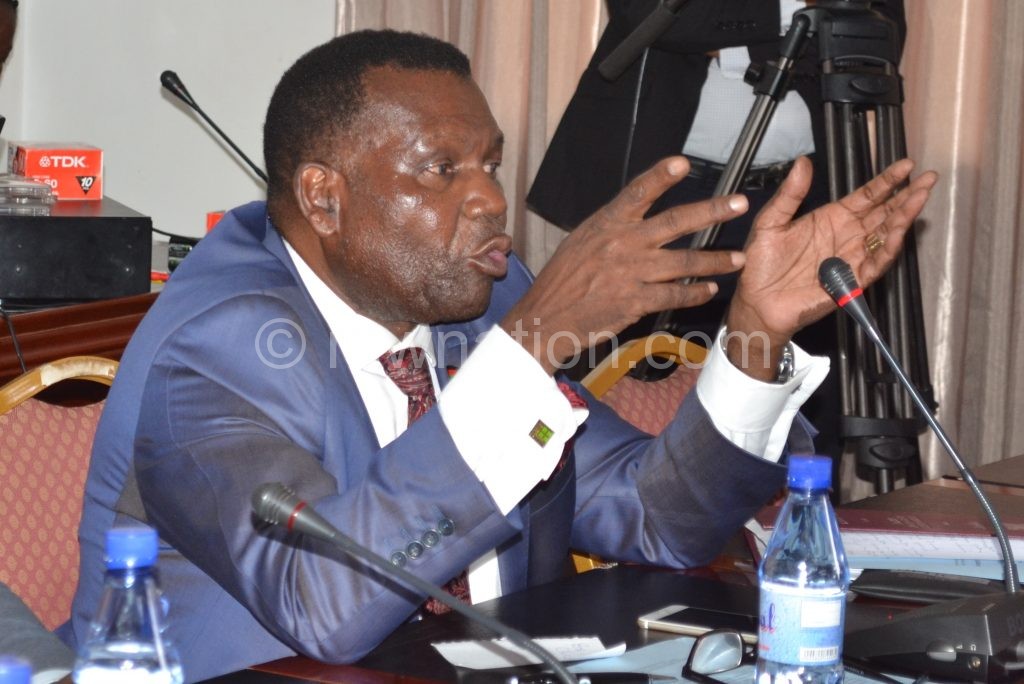Govt ignores inquiry reports
Government has for over five years ignored recommendations of commissions of inquiry, a situation analysts say is a waste of public resources and a mockery of justice.
A Nation on Sunday analysis of three commissions of inquiry conducted between 2011 and 2013 show a general lack of interest from government to put to use recommendations of the reports.

before a commission of inquiry
The reports analysed include a seven–month long inquiry into the sudden death of President Bingu wa Mutharika, an eight-month inquiry on events surrounding the July 20-21 demonstrations and a five-month inquiry into the death of a Polytechnic student, Robert Chasowa.
Nation on Sunday has established that a commission of inquiry involves huge resources, which include setting up of a secretariat, sitting and travelling allowances for members of the commission as well as witnesses in some cases.
For example, in each of the analysed inquiries there were an average of eight commissioners with support staff who had to meet and travel to places on a number of days, with fuel, food and accommodation as part of the expenses.
A source familiar with inquiries told Nation on Sunday that setting up a commission of inquiry is not a cheap exercise.
“Generally, it is a demanding exercise. Think of commissioners meeting for a period of eight months as was the case with the inquiry into July 20 demonstrations where 170 witnesses had to be interviewed? And site visits require funds,” said the source.
Office of the President and Cabinet (OPC) had not responded to our questionnaire to establish the actual cost of the three inquiries under review, but the Malawi Law Society (MLS) said it is not fair for government to ignore inquiry recommendations considering the rationale of setting up the same.
Legal scholar Professor Danwood Chirwa also hinted that establishment of a commission of inquiry was a deliberate political ploy to delay justice or avoid taking action on a pressing matter of national interest.
According to Chirwa, experience has shown that recommendations of inquiries are not implemented, making the whole process a waste of time and money.
He argues that while recommendations are rarely implemented, the spirit of the law which allows for the setting up of a commission of inquiry has good intentions.
“It has been said that one way by which to avoid doing anything about a pressing national issue in Africa is by appointing a commission of inquiry. This comment arises from the fact that the reports of commissions of inquiry rarely get implemented.
“But, in truth, there are good reasons the instrument of a commission of inquiry was devised. A public inquiry can be used to establish facts about an important matter of public interest that can lead to an informed decision,” he said.
Chirwa argued that not all cases require an inquiry as some issues are straightforward.
He cited the inquiry into the death of Bingu as necessary as it hinged on policy matters.
“The Maizegate inquiry, however, was not necessary because it was clear from the beginning that the issue was criminal and, therefore, criminal agencies had responsibility of investigating.
“The Chasowa inquiry and the July 20/21 were similarly questionable for the same reason,” added Chirwa.
Malawi Law Society president Alfred Majamanda said in a response to a questionnaire that while recommendations of a commission of inquiry are not legally binding, government needs to act on them for purposes of justice.
He said in some cases failure to act on these recommendations could be a violation of human rights.
“It may also be possible to argue that certain constitutional provisions have been violated as a result of the failure to act,” Majamanda observed.
A review of the findings of the Commission of Inquiry into the death of Bingu show that government has partly implemented one recommendation, which is improving the status of the intensive care unit at Kamuzu Central Hospital and increasing number of beds.
“We have moved steps forward as you can see. This is an improvement from where we were and we are trying to make it even better so as we do not lose life willy-nilly,” explained KCH director Jonathan Ngoma.
But our investigations show that in other central hospitals—Zomba and Queen Elizabeth—the situations remain unchanged with complaints of limited bed capacity and equipment such as ventilators.
Capital Hill also ignored advice to establish a presidential medical facility at Kamuzu Barracks, which is near the State House, for the President’s security and privacy as is the case in other countries, according to the inquiry report.
On July 20 demonstrations, the commission of inquiry report suggested a number of points which have not been put to use.
“The commission observed that as a constitutional right, the Executive must not unnecessarily prevent people from exercising this right. Realisation of the right includes relevant authorities issuing out approvals to notices without undue delay and without political interference, as long as all legal procedures have been satisfied,” reads the report.
It also asked for investigations and prosecution of police officers who looted property as well as investigation of the ‘panga’ incident that occurred on July 19 2011 in Blantyre.
The Chasowa inquiry, among other recommendations, asked police to speed up investigations on the murder of the Polytechnic student in 2011. It further outlined a list of suspects believed to have taken part in the murder, but almost six years later there is no tangible progress.
Asked on the progress, National Police spokesperson James Kadadzera said: “On July 20, some officers have been prosecuted. For Chasowa, like Issa Njauju the proposal is to find an independent investigator and government is in the process of identifying one”.





